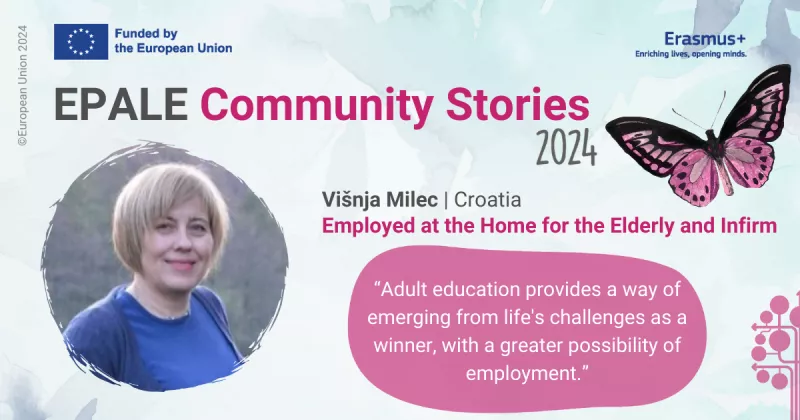Outreach strategies for sustainable basic skills provision

- Basic skills programmes targetting adults with lower-level qualifications are of key importance for equity and inclusion. They also contribute to enabling societies to react better and more efficiently to change.
- The efficiency and sustainability of basic skills programmes are greatly dependent on how many of the learners who started the programmes persist in their training, achieve their goals, and can go on to further training initiatives if they so wish.
- Outreach and guidance measures can significantly contribute to the success of basic skills trainings in a number of ways:
- through initial contact leading to training opportunity (outreach)
- through encouraging the learner’s motivation and persistence (outreach & guidance)
- through raising awareness among learners, society and stakeholders (decision-makers, employers etc) of the benefits of basic skills initiatives
Outreach, guidance and learners’ motivation are of key importance in times when adults with lower qualifications are at risk of labour market and hence social exclusion.
This blog post aims at:
- taking a stock on outreach measures, recommendations in EU
- presenting creative axamples of outreach awareness raising initiative
The importance of outreach measures has long been discussed.
The European Commission’s ET2020 Working group on adult learning, created in 2013, produced in 2015 a report entitled “Improving Policy and Provision for Adult Learning in Europe”. The report establishes that
- a major boost is needed to raise adults’ basic skills in Europe.
- all EU Member States need to help many more adults to improve their competences in the basic skills they need in order to thrive in today’s society.
- Member States need to establish proactive policies to improve opportunities and incentives for their citizens to take part in basic skills learning activities.
- more effective, targeted outreach strategies at national, regional and adult learning providers’ level can raise awareness of the basic skills gap and increase individuals’ motivation to improve their skills.
Experience shows that the target group that is in most need of basic skills learning provision is the one that is less likely to take any initiative towards learning. Adult learning is based on a voluntary commitment on the part of the learner and depends on high levels of motivation and proactivity. Those learners who most need to increase the level of their basic skills are consistently those who entail the biggest challenge for outreach initiatives. According to PIAAC data, more than three in four adults with low skills across the OECD countries do not participate in learning activities. Adults with low levels skills are less than half as likely to participate in adult learning as those with higher skills. According to PIAAC results, only 20% of adults with low skills participate in adult learning.
Outreach measures are normally directed at increasing the awareness of the target group regarding the need to acquire a higher level of basic skills. It is important to state that all outreach and motivation measures aim at involving potential candidates for the whole of this process.
In an OECD report on engaging low-skilled adults in further learning, we find five recommended actions that can increase the participation of the target group in basic skills learning provision:
- Find creative ways to reach out to potential learners (through work place programs, through family learning schemes, through community-based learning, or through mobile learning and information units). Actively reach out to adults in the places they frequent, including workplaces, community institutions and public spaces. Identify actors that have established links with adults with low skills. Build the capacity of these actors to inform adults with low skills and encourage them to take up learning opportunities.
Initiatives
In Belgium, the Brussels-based project Formtruck is a walk-in mobile information centre on training opportunities. It aims to engage low-qualified jobseekers and young people not in employment, education or training in locations where they usually spend time, e.g. at events, parks and public squares.
The Slovenian Lifelong Learning Week (LLW) has been attracting public attention, since 1996, to thousands of inspiring educational, promotional, information and guidance, as well as social and cultural events. The festival has grown into a movement which annually involves several hundreds of institutions, NGOs, interest groups and other stakeholders. At the national level, the LLW is coordinated by the Slovenian Institute for Adult Education (SIAE).
- Offer holistic and personalised advice and guidance. Develop holistic advice and guidance services specifically for low-skilled adults. Set-up one-stop shops and establish partnerships with other organizations serving adults with low-skills to ensure that there is consensus in the advice given. Ensure that guidance services are provided by qualified staff, who have the ability to tailor the service to the needs and situation of each adult individually.
Initiative
In Iceland, Lifelong Learning Centres provide both education and career counselling with a specific focus on low skilled adults. They focus specifically on the skills of their staff: guidance counsellors hare qualified both in education and in counselling. There are dozens of Lifelong Learning Centres around Iceland – a country with 360 thousand inhabitants - which conduct around 10 000 guidance counselling sessions with people with low qualification levels per year.
- Create interesting and relevant learning opportunities. Take into account how adults learn when designing learning opportunities: they should be practical, problem-oriented and closely linked to the context of the learner. Offer blended learning opportunities (face-to-face combined with distance learning), giving learners the option to choose what works best for them. Ensure that the learning mode is appropriate for the target group, make learning enjoyable, and provide additional support where needed.
Initiative
In Germany, the German project eVideoTransfer has been offering digital learning opportunities for workers with low basic skills and limited time to take-part in classroom learning. The learning model is tailored to the specific type of work the learners do and combines learning content on basic skills and vocational training. All training is web-based and takes the learner through an engaging storyline, through videos. Learners need a basic level of digital literacy, but for those who don’t have it there is an introductory learning module about how to use mouse and keyboard. VideoTransfer is a project within the German AlphaDekade and is funded by the Germany Ministry of Education.
- Recognise existing skills. Low-skilled adults need to be given access to accreditation of prior learning procedures. They also need accessible and pragmatic advice and guidance services that can help them to prepare for the recognition process. Use employers to raise awareness about the existence of recognition procedures.
- Organize learning provision in modules. Each program should be a series of learning modules and learners should be given micro-credentials after successfully completing each unit. Completing the series gives access to a full qualification. Adults should be able to choose modules from different types of provision, creating their own learning path.
Initiatives
In Denmark, basic skills training provision offers an exceptional amount of flexibility for learners. Learners are able to combine modules from different types of adult learning provision to obtain a formal qualification. This flexible approach allows high shares of adults to obtain qualifications through adult learning.In Belgium, the basic skills training offered by the Flemish Community is characterized by modularization and the possibility of blended learning. The programs start at different points in time through the year, to further increase the flexibility of the offer. Adult Basic Education, which is provided in 13 centers across the community, includes literacy, numeracy, and digital skills courses. Adults obtain a partial certificate after each module they attend and can complete a full qualification over time. To encourage centers to offer blended learning, the government gives a financing of 120% to modules which include at least 25% of distance learning. The Flemish government gives additional funding each year to support a centres that want to start a new program with a substantial share of distance learning.
For further explanations about the concepts of outreach, guidance and support, motivation, persistence, and sustainable basic skills policies, we invite you to read the upcoming OER unit on outreach, motivation and persistence created by EBSN experts.






Kā izkustināt vezumu?
Lielisks raksts! Šo noteikti vajadzētu diskutēt ar politikas veidotājiem un lēmumu pieņēmējiem. Ja mēs pieaugušo izglītību redzam kā programmu veidošanu un īstenšanu, bet neredzam, ka ļoti liela daļa pieaugušo vispār negrib mācīties, tad joprojām būsim tur, kur esam, un taisīsim arvien jaunus projektus bez jauna rezultāta. Lai izkustinātu vezumu, vajadzīga radoša pieeja.